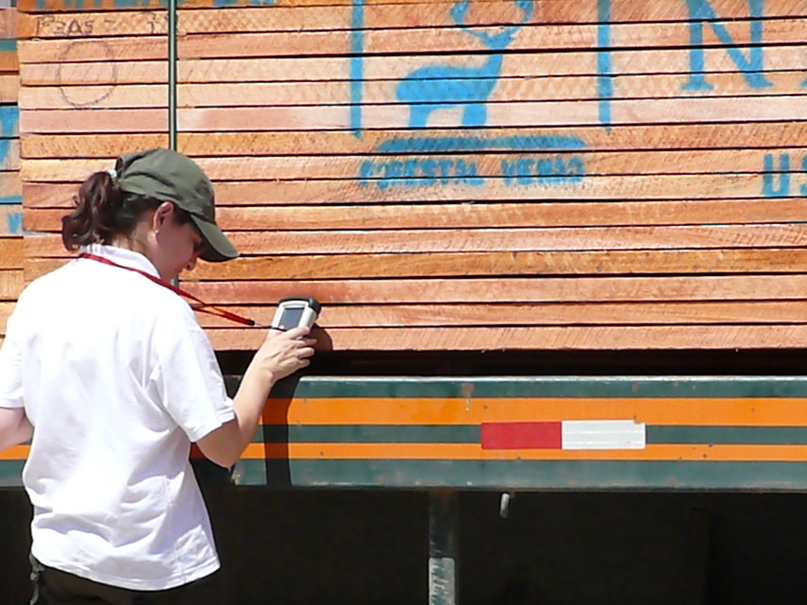Forest law enforcement, governance and trade

An officer scans a bar code of a tropical timber consignment in Pucallpa, Peru, before its shipment to international markets. ITTO works with its members to strengthen capacity in timber tracking and other aspects of tropical forest law enforcement, governance and trade. Photo: Bosques Sociedad y Desarrollo
Forest law enforcement, governance and trade is a term commonly use to encompass the efforts made to ensure that forest laws, rules and regulations are complied with during the harvesting, transport, processing and trade of forest products and to address non-compliance with subnational, national or international laws concerned with forests and forestry.
In general, non-compliance with forest laws:
In recent years, major markets for tropical timber and timber products have sent strong signals to importers on the need to demonstrate that forest products are from legal or sustainable sources. For example, the Lacey Act in the United States of America, the European Union Timber Regulation, Australia’s Illegal Logging Prohibition Act and the Japan Clean Wood Act all require evidence of the legality of imported timber.
A decision by the International Tropical Timber Council in November 2001 provided resources whereby tropical timber-producing countries could obtain assistance from the Organization to devise ways of improving forest law enforcement. This decision also encouraged members to submit project proposals to tackle unsustainable or illegal timber harvesting, and the illegal trade in tropical timber.
Since then, ITTO has assisted its tropical member countries to strengthen forest law enforcement and combat illegal logging and the illegal trade of forest products by:
In complementary approaches, ITTO is also helping to increase market transparency and monitor forest certification.
In general, non-compliance with forest laws:
- Demotivates good actors already implementing sustainable forest management and complying with rules and regulations
- Puts a brake on forest investment
- Creates market distortions—because illegal forest products do not reflect the real value of sustainable and legal timber and other forest products
- Diminishes government revenues through a lack of taxation and other fees
- Hampers efforts to promote sustainability among consumers
- Has negative impacts on the environment and the livelihoods of forest-dependent communities.
In recent years, major markets for tropical timber and timber products have sent strong signals to importers on the need to demonstrate that forest products are from legal or sustainable sources. For example, the Lacey Act in the United States of America, the European Union Timber Regulation, Australia’s Illegal Logging Prohibition Act and the Japan Clean Wood Act all require evidence of the legality of imported timber.
A decision by the International Tropical Timber Council in November 2001 provided resources whereby tropical timber-producing countries could obtain assistance from the Organization to devise ways of improving forest law enforcement. This decision also encouraged members to submit project proposals to tackle unsustainable or illegal timber harvesting, and the illegal trade in tropical timber.
Since then, ITTO has assisted its tropical member countries to strengthen forest law enforcement and combat illegal logging and the illegal trade of forest products by:
- Establishing clear, sound, transparent and coherent forest policy and legal frameworks
- Building institutional capacity for forest law enforcement capacity at the local, subnational and national levels
- Developing forest information systems, timber-identification methodologies and timber-tracking mechanisms that minimize bureaucracy, streamline legal procedures and simplify regulations.
In complementary approaches, ITTO is also helping to increase market transparency and monitor forest certification.
Related links
-
Download Tracking Sustainability: Review of Electronic and Semi-electronic Timber Tracking Technologies
(published 2012)
-
Download Forest Law Compliance and Governance in Tropical Countries
(published 2010)
-
Download Forest Governance and Climate-change Mitigation
(published 2009)
-
Download Best Practices for Improving Law Compliance in the Forestry Sector
(published 2005)
- See special edition of the Tropical Forest Update on Keeping track of the forest
- Watch the video Electronic Forest Enterprise Information System of Guatemala
- Watch the video ITTO-CITES near infrared spectroscopy for the monitoring of mahogany trade
- Watch the video Conservando la caoba (“Conserving mahogany”—Spanish only)
- Watch the video Model for Peruvian timber traceability system
- Watch the video Gobernanza forestal en Ecuador (“Forest governance in Ecuador”—Spanish only)
- Watch the video Illegal logging and forest law compliance in Ghana
- See ongoing projects on timber tracking and species identification
- See completed projects on timber tracking and species identification
- See ongoing projects on forest law enforcement
- See completed projects on forest law enforcement